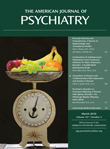The review article by Brown and Derkits in this issue (
1) is one of a series of papers that have been published in
The American Journal of Psychiatry and other journals over the past year on prenatal risk factors for schizophrenia. Brown and Derkits review the evidence for prenatal infection as a risk factor for schizophrenia and calculate that over 30% of the risk for schizophrenia can be attributable to such infections. The infections include maternal influenza, toxoplasmosis, and genitourinary diseases. The review exhaustively compiled the relevant data from many decades of studies, beginning with epidemiological studies that pointed to a possible increase in the incidence of schizophrenia in cohorts of young adults who had been fetuses during earlier flu epidemics. The data were refined by examination of maternal serum antibodies that demonstrated the actual presence of infection. Although it was initially assumed that the fetus itself was infected, an important insight was that the mother's reaction to the infection, the production of cytokines and antibodies, compromises the integrity of the fetal-placental link. Brown and Derkits review findings of elevated cytokines in the plasma of pregnant women whose offspring later develop schizophrenia. In crude terms, as the mother fights off the infection, her immune response also begins to reject the fetus. The result of the elevation in cytokines, if there is not a spontaneous abortion, may be compromised fetal brain development that becomes part of the risk for the subsequent onset of schizophrenia later in life.
The interaction between maternal infection and another well-characterized risk factor for schizophrenia, genetic background, was demonstrated in an article by Clarke et al. that appeared in the
Journal last year (
2). Family history of a psychotic disorder in either a parent or a sibling, combined with a mother who had pyelonephritis during pregnancy, produced risk for schizophrenia in the offspring that was nearly double the risk for schizophrenia had the mother not been infected and more than four times the risk for schizophrenia when there is no family history of schizophrenia. Pyelonephritis in the mother is not an infection that is transmitted to the fetus. Rather, the infection is eliciting a response in the mother that then affects the fetus. Cytokines are released in response to foreign lipopolysaccharides, which are part of the cell wall of the bacteria invading the mother's urinary tract. The cytokine response does not require the production of specific antibodies, and therefore it is activated immediately. However, the cytokine response is accordingly less specific in its actions and can attack the placenta as well as the intended infectious targets. What is noteworthy about the Clarke et al. article is that the increase in risk from maternal infection alone was not significant, but it magnified the effects of the familial genetic risk considerably. In their analysis, the synergy between genetic risk and maternal infection accounted for 38%–46% of the population risk for schizophrenia.
Brown and Derkits call for the prevention of maternal infection as a logical preventive step for schizophrenia. As of this writing, the H1N1 flu epidemic is more muted than initially predicted, but it is nonetheless worrisome that it appears to target pregnant women. However, the prevention of maternal infection is not the primary role of psychiatrists, and readers might conclude that we have one more example of a pathophysiological mechanism for mental illness that, once understood, no longer is the province of psychiatrists. Indeed, the prevention of maternal infection seems reminiscent of the prevention by penicillin of syphilitic brain infections, the archetypal example of an intervention that has eliminated many cases of psychosis but has little to do with the practice of psychiatry. However, there are other aspects of prenatal risk that very much require psychiatric intervention.
Mäki et al. reported in the
Journal last month that prenatal maternal depression is a second risk factor that appears to affect the risk for schizophrenia, also in an interaction with genetic risk (
3). As Clarke et al. reported for maternal pyelonephritis, maternal depression by itself did not significantly increase the risk for schizophrenia in the offspring. However, maternal depression increased the effect of familial genetic risk by nearly fourfold. Depression increases a number of maternal hormones, including both cortisol and the cytokines, any or all of which might have effects on fetal brain development similar to those proposed to occur during maternal infection. In the past several years, a number of articles on the prevalence of prenatal depression and the risks and benefits of its treatment have appeared in the
Journal (
4). While we do not know if successful treatment will reduce the effects of maternal depression on fetal brain development and the risk for later mental illness, these epidemiological studies suggest that psychiatrists and other physicians need to be vigilant with regard to the prevention and treatment of depression in expectant mothers. For example, a woman contemplating pregnancy whose spouse has a family history of major mental illness and who herself has a history of recurrent depression might be counseled about adequate treatment for her depression by the time of conception. As always, our psychiatric advice should recognize that self-medication with abused substances occurs as well. Yet another recent epidemiological study found that maternal substance abuse, particularly smoking, also significantly increases the risk of schizophrenia in the offspring (
5).
Although brain development occurs throughout the life cycle, the primary development of the brain occurs during fetal life. Brown and Derkits and the authors of the other recently published reports remind us that life-altering illnesses such as schizophrenia may result from small differences in early brain development. Strategies to protect the integrity of this process may ultimately be required to prevent much of the human suffering associated with chronic mental illness. A daunting problem will be to initiate and evaluate interventions whose full effects on mental illness may not be appreciable until the fetus reaches adulthood, several decades later.

